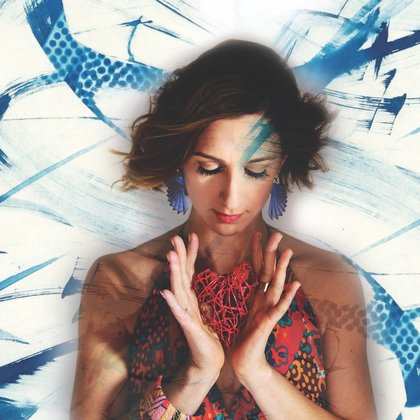Global Tenderness: Jazz Songwriter Eleanor Dubinsky Opens up to the Beauty of Human Vulnerability on New Lisbon-Inspired Album
In the end, it was the people. Singer, polyglot songwriter, and multi-instrumentalist Eleanor Dubinsky was drawn to Lisbon after years of travel and exploration, but the music she made there surprised her.
“It’s about artists, not about music that happens to be from particular countries. I had some preconceptions going into this album, but I learned that there are many more layers to these worlds than I imagined. it’s infinite what I can learn. It expands beyond a particular genre. It’s about a collaborative work from a group of artists with something to offer that spans genres and geographies.”
On Soft Spot of My Heart (release: March 30, 2018), Dubinsky leans into the vulnerabilities and delicate moments we all face in relationship to one another, drawing strength and inspiration from musical friendships she forged in Lisbon and New York. Spurred by the “awakened heart” approach of Tibetan Buddhist teacher Pema Chodron, Dubinsky treads lightly through the thickets of affection and attachment, discovering a grace in the elegant melodies and Lus- African sway her collaborators bring to the table.
“The soft spot is about holding with deep compassion all the stuff we run away from. This helps us love others better. If this process feels painful, I have found I need to grow my brain to contain more, more of others’ perspectives and stories and needs. I try to carry this understanding into my songwriting,” explains Dubinsky. “You have to continuously expand your understanding of what a human being can do, of what they can be.”
By finding a artful dialog with musicians from New York, Brazil, Cape Verde, and Portugal, Dubinsky urges all of us to embrace that sweet spot and hold the world there.
NYC release celebration: Joe’s Pub, April 10, 2018 at 7 PM
{full story below}
Dubinsky grew up in St. Louis, getting an early start in classical cello and jazz music. Her surroundings sparked an ongoing interest in the broader world, especially as she traveled solo as a young woman, spending significant time in France, the Czech Republic, Argentina and Mexico, and mastering French and Spanish. Her curiosity deepened the more she explored, and that exploratory spirit was channelled as she plunged into the contemporary dance scene as a young transplant to New York.
Eleanor Dubinsky Soft Spot of My Heart (release: March 30, 2018)
Ron Kadish
1-812-339-1195 x 202 ron@rockpaperscissors.biz
rockpaperscissors.biz
After ten years in the “downtown dance” scene, music still called to her. Standing at the crossroads of embodied rhythm, social commentary and engagement, Dubinsky wrote songs with lyrics in English, French and Spanish. Then, one day, she heard the music of Lisbon-based, Cape Verdean descended singer-songwriter Sara Tavares. “It felt like listening to my own blood and bones,” reflects Dubinsky. “It makes you want to dance, and I love the melodies, the message. I’ve learned over time how intentional Sara is about her excellence. It’s not an accident, it's not magic. She composes, rehearses and performs with a focus that I also admire and have learned from.”
Tavares’s sound whetted Dubinsky’s longing to know more about the Lisbon scene, particularly the Cape Verdean and Angolan music happening in the city. Through her extended artist community, trips to places like Cape Verde, and a lot of hard work, she got to know several of the musicians Tavares works with regularly, some of the strongest and most creative players in Portugal. Three of them (Rolando Semedo, Miroca Paris, and Ivo Costa) appear on Soft Spot. “Living in Lisbon, you can’t help but hear semba, funana, coladeira, mourna, samba, bossa nova,” says Dubinsky. “It’s in the air, at least with the musicians I became close with.”
Though drinking from this well, she knew she had to forge her own path forward, absorbing what she could without losing sight of her own vision. “You have to be honest to learn. I don’t want to imitate people. I want to find my own sound, my own way,” Dubinsky muses. “I am not interested in getting out of who I am via ‘outside’ music, of being the American musician who works for a bit with this or that style, then moves on. These genres feel like part of my own nature, something I can grow and extend into.”
“She’s got a lot of different ideas, she’s got a lot going on, from all sorts of different cultures,” says guitarist Wesley Amorim. “It’s not this genre or that genre,” adds bassist Rolando Semedo. “It’s Eleanor’s music, plain and simple.”
The songs that resulted over several years of collaboration, rehearsing, and recording in New York and Lisbon keep the urbane bittersweetness of good New York jazz songwriting, thanks in part to pianist and writing partner Frank Ponzio’s soulful playing and elegant ballads. But there’s always a delicious twist, a small quirky rhythm in a guitar line (“Turn it Around”) or a savoring of percussive layers (“Cuando”) that speaks to Dubinsky’s engagement with her Lusophone musician friends.
Eleanor's key collaborators, Amorim, Semedo, Paris (percussion), Costa (drums) and Ponzio, inspired her in the rehearsal room, studio booth, and with the particular cultural context and musical experience they brought to the music. “A lot of music from the homelands of the musicians I work with is created to help people understand and grapple with their everyday lives and their complex histories. Musicians act as cultural interpreters and activists. That’s what I’d like to do.”
On multilingual tracks like “Cuando,” Dubinsky witnesses and transmits the homesickness and love she witnessed working side by side with migrants in service jobs; feelings and sacrifices that anyone working far from home may encounter. “You Are Special” is a loving call to those who have felt marginalized and intimidated by the fearful rhetoric and coarse tenor of America’s current national conversation.
Dubinsky calls for justice, consideration, and connection, but beginning and ending with our humanity. “People need solace. An artist’s process of unearthing emotions, of putting stuff out there and being vulnerable is a service. We often talk about what’s difficult to talk about,” says Dubinsky. “We put feelings out there, and that’s a risk, taken in a poetic way. It’s healing.
article posted by:Eleanor Dubinsky, Dubinsky, Eleanor



